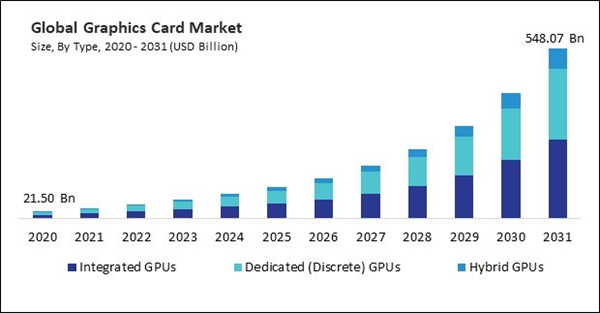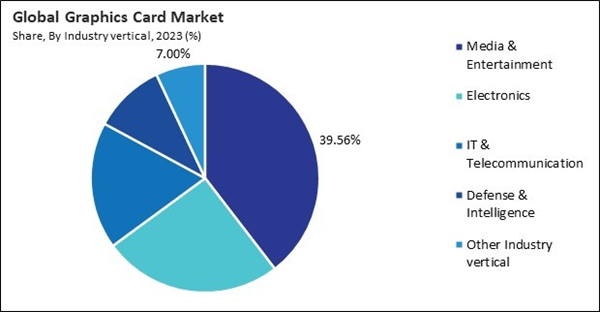The North America segment recorded 38% revenue share in the market in 2023. As the headquarters for major GPU manufacturers like NVIDIA, AMD, and Intel, North America remains a hub for innovation in graphics processing. The rapid expansion of AI-based applications, deep learning, and cloud computing has led to increased adoption of dedicated and integrated GPUs in industries like healthcare, defense, and finance.
Modern AAA games are designed with photorealistic graphics, real-time ray tracing, and high refresh rates, requiring powerful GPUs to deliver smooth gameplay experiences. According to a Newzoo report, the global gaming industry is projected to generate $187.7 billion in revenue, reflecting a 2.1% year-on-year growth. This rising demand for high-performance gaming experiences has fueled the adoption of next-gen GPUs, particularly from NVIDIA, AMD, and Intel, which continue to push the limits of graphics performance with AI-driven enhancements, better cooling solutions, and power-efficient architectures. Hence, as gaming technology advances and eSports continues its rapid expansion, the graphics card market is poised for significant growth, with demand expected to rise further in the coming years.
Additionally, Artificial Intelligence (AI) and Machine Learning (ML) technologies rely on vast amounts of data processing and require computational power far beyond what traditional Central Processing Units (CPUs) can offer. Deep learning, a subset of AI, involves training neural networks with enormous datasets, which can take weeks or months using conventional hardware. However, with their parallel processing capabilities, GPUs can accelerate these computations, making AI model training and execution much faster and more efficient. Thus, as AI-driven innovations expand across industries, the demand for specialized GPUs will continue to surge, driving significant growth in the graphics card market.
However, Modern GPUs rely on semiconductor manufacturing, which requires rare and costly materials such as silicon wafers, gold, and other high-grade metals. As global demand for these resources surges, their prices rise, directly impacting GPU production costs. Additionally, manufacturers have transitioned to advanced fabrication nodes like 5nm and 4nm, which require cutting-edge equipment and expertise while improving performance and efficiency. Hence, GPU prices are expected to remain high until production costs stabilize and supply chains recover, limiting accessibility and slowing overall market growth.
Driving and Restraining Factors
Drivers
- Increasing Demand For Gaming & Esports
- Rapid Advancements In AI & Machine Learning
- Rise In Demand For High-Performance Computing (HPC)
Restraints
- High Production Costs And Affordability Issues
- Declining Demand From Crypto Mining
Opportunities
- Advancements In GPU Architecture & Ray Tracing
- Expansion Of Augmented Reality (AR) & Virtual Reality (VR)
Challenges
- Substantial Supply Chain Disruptions
- Limited Innovation And Performance Gains
Type Outlook
Based on type, the market is classified into dedicated (discrete) GPUs, integrated GPUs, and hybrid GPUs. The dedicated (discrete) GPUs segment procured 41% revenue share in the market in 2023. These standalone GPUs, manufactured by NVIDIA, AMD, and Intel, are essential for high-performance gaming, professional content creation, AI-driven applications, and deep learning. Despite their higher costs and power consumption, the rising demand for 4K gaming, virtual reality (VR), video editing, and 3D rendering has sustained the importance of dedicated GPUs.Industry vertical Outlook
By industry vertical, the market is segmented into electronics, IT & telecommunication, defense & intelligence, media & entertainment, and others. The electronics segment procured 25% revenue share in the market in 2023. The electronics segment is fueled by the increasing integration of GPUs in smart devices, consumer electronics, and AI-powered applications. Modern smart TVs, AR/VR headsets, gaming consoles, and IoT devices rely on advanced graphics processing to enhance user experiences, providing high-resolution visuals, real-time motion smoothing, and AI-driven upscaling.Device Outlook
On the basis of device, the market is divided into computers (desktops & laptops), tablets, smartphones, gaming consoles, televisions, and others. The computers (desktops & laptops) segment witnessed 26% revenue share in the market in 2023. Enthusiasts and professionals require powerful discrete GPUs for 3D rendering, video editing, machine learning, and scientific computing, driving strong sales in workstations, gaming desktops, and high-end laptops. With PC gaming expanding globally, esports gaining traction, and virtual reality (VR) adoption increasing, GPU manufacturers like NVIDIA, AMD, and Intel continue to push the boundaries of performance.Regional Outlook
Region-wise, the market is analyzed across North America, Europe, Asia Pacific, and LAMEA. The Asia Pacific segment acquired 27% revenue share in the market in 2023. Countries like China, Japan, South Korea, and India are witnessing significant growth in PC gaming, esports, and content creation, leading to a surge in demand for high-performance GPUs. Additionally, the presence of leading chip manufacturers such as TSMC and Samsung gives the region a strategic advantage in GPU production.List of Key Companies Profiled
- NVIDIA Corporation
- Advanced Micro Devices Inc.
- Intel Corporation
- ASUSTeK Computer Inc.
- Micro-star International Co., Ltd.
- GIGA-BYTE Technology Co., Ltd.
- Zotac Technology Limited (PC Partner Group Limited)
- TUL Corporation (Powercolor Computer, Inc.)
- EVGA Corporation
- PNY Technologies, Inc.
Market Report Segmentation
By Type
- Integrated GPUs
- Dedicated (Discrete) GPUs
- Hybrid GPUs
By Industry vertical
- Media & Entertainment
- Electronics
- IT & Telecommunication
- Defense & Intelligence
- Other Industry vertical
By Device
- Smartphones
- Computers (Desktops & Laptops)
- Tablets
- Gaming Consoles
- Televisions
- Other Device
By Geography
- North America
- US
- Canada
- Mexico
- Rest of North America
- Europe
- Germany
- UK
- France
- Russia
- Spain
- Italy
- Rest of Europe
- Asia Pacific
- China
- Japan
- India
- South Korea
- Singapore
- Malaysia
- Rest of Asia Pacific
- LAMEA
- Brazil
- Argentina
- UAE
- Saudi Arabia
- South Africa
- Nigeria
- Rest of LAMEA
Table of Contents
Companies Mentioned
- NVIDIA Corporation
- Advanced Micro Devices Inc.
- Intel Corporation
- ASUSTeK Computer Inc.
- Micro-star International Co., Ltd.
- GIGA-BYTE Technology Co., Ltd.
- Zotac Technology Limited (PC Partner Group Limited)
- TUL Corporation (Powercolor Computer, Inc.)
- EVGA Corporation
- PNY Technologies, Inc.










